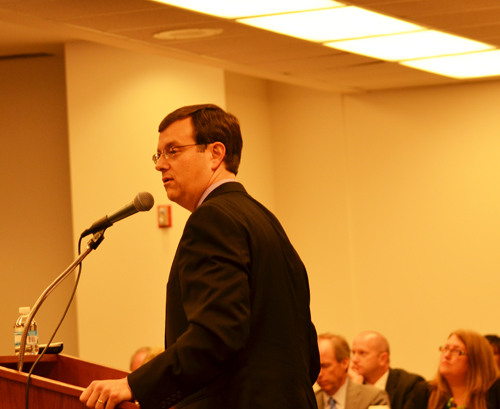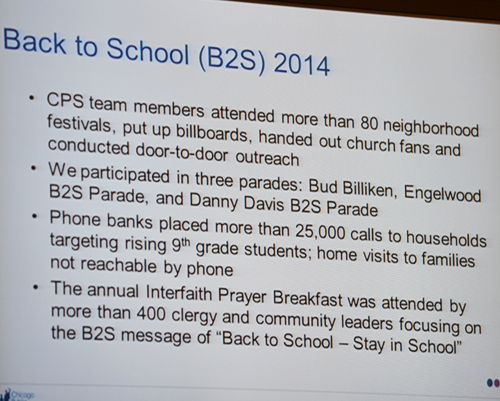AERA says stop using 'value added' to evaluate teachers...
 CPS "Chief Accountability Officer" John Barker presented one of his reports to the September 24, 2014 meeting of the Board of Education (above) without even a snicker about the stuff he put up on his Power Point. Even after Barbara Byrd Bennett, who hired Barker, was ousted and found guilty of federal crimes, Barker, whose "VAM" expertise came from his time in Tennessee, remains in power at CPS at an annual salary of $175,000. Substance photo by George N. Schmidt.The American Educational Research Association (AERA) has issued a warning against the use of so-called "value added" measures for high-stakes decisions regarding teachers, other educators (like principals), and teacher preparation programs. Assessment's first rule says that tests should be used only for the purpose for which they were created. At every point a test should be used only for its purpose. The purpose of an eighth grade reading test is to evaluate the reading abilities of those who are evaluated.
CPS "Chief Accountability Officer" John Barker presented one of his reports to the September 24, 2014 meeting of the Board of Education (above) without even a snicker about the stuff he put up on his Power Point. Even after Barbara Byrd Bennett, who hired Barker, was ousted and found guilty of federal crimes, Barker, whose "VAM" expertise came from his time in Tennessee, remains in power at CPS at an annual salary of $175,000. Substance photo by George N. Schmidt.The American Educational Research Association (AERA) has issued a warning against the use of so-called "value added" measures for high-stakes decisions regarding teachers, other educators (like principals), and teacher preparation programs. Assessment's first rule says that tests should be used only for the purpose for which they were created. At every point a test should be used only for its purpose. The purpose of an eighth grade reading test is to evaluate the reading abilities of those who are evaluated.
For Chicago, the prospects of those currently leading the school system are not good. Most of those appointed by Mayor Rahm Emanuel as the latest heads of the nation's third largest school system since July 2015 are not educators. Most of them, starting from the top ("Chief Executive Officer" Forrest Claypool) know more about bus and subway scheduling than about the complex realities of teaching and evaluating children's learning. In addition to former Chicago Transit Authority (CTA) head Forrest Claypool, the majority of those at the top positions in CPS are former transit experts, now placed to head a school system.
Chicago is still committed to "value added" measures of evaluating teachers and principals. As of the most recent position files from CPS, John Barker is still in charge of evaluation at CPS.
Barker, whose title is "Chief Accountability Officer," was brought to Chicago by former CEO Barbara Byrd Bennett in December 2012, shortly after Rahm Emanuel made Byrd Bennet "Chief Executive Officer", replacing Jean-Claude Brizard. Barker came to Chicago from Tennessee, where his expertise was in "value-added" nonsense in the state that has become infamous for the frauds of "VAM". But contrary to best practices and all the research, Chicago has kept Barker in charge of "accountability", at an annual salary of $175,000, and there is no indication that anyone at the top of the latest CPS administrative hierarchy intends to change anything about the valueless "value added" versions of reality that are being foisted on the schools and principals through the "networks" and other layers of administration. In Chicago, as the joke is growing, the buses may not run on time, but that's because the people who ran the buses now run the schools. OIC, as Substance used to say -- "Only in Chicago"!
Barker's "metrics" have been paraded in front of the Board of Education now under two Board presidents, and three CEOs (two regular ones and an "interim"). None of the Board preisdents knows anything about educating children. David Vitale and Frank Clark were both corporate executives. The CEOs? Well, one, Byrd Bennett, now ranks as one of the most corrupt school leaders in the history of the United States. But her "tiers" are still causing tears across the school system, while the claims of VAM still mystify many.
 The Chicago Board of Education was not treated to another September 2015 Power Point at its September 2015 meeting, as it had been a year earlier when "Chief Accountability Officer" John Barker presented the Board with what critics called the "BS" Power Point (above). Barker's presentations to the Board of Education, under three CEOs and two Board presidents, have never been challenged, despite the fact that they are based on, well, BS, including the "Value Added" BS that has now been condemned by the AERA (November 2015). The following press release was issued by AERA on Veterans Day, 2015...
The Chicago Board of Education was not treated to another September 2015 Power Point at its September 2015 meeting, as it had been a year earlier when "Chief Accountability Officer" John Barker presented the Board with what critics called the "BS" Power Point (above). Barker's presentations to the Board of Education, under three CEOs and two Board presidents, have never been challenged, despite the fact that they are based on, well, BS, including the "Value Added" BS that has now been condemned by the AERA (November 2015). The following press release was issued by AERA on Veterans Day, 2015...
WASHINGTON, D.C., November 11�In a statement released today, the American Educational Research Association (AERA) advises those using or considering use of value-added models (VAM) about the scientific and technical limitations of these measures for evaluating educators and programs that prepare teachers. The statement, approved by AERA Council, cautions against the use of VAM for high-stakes decisions regarding educators.
In recent years, many states and districts have attempted to use VAM to determine the contributions of educators, or the programs in which they were trained, to student learning outcomes, as captured by standardized student tests. The AERA statement speaks to the formidable statistical and methodological issues involved in isolating either the effects of educators or teacher preparation programs from a complex set of factors that shape student performance.
�This statement draws on the leading testing, statistical, and methodological expertise in the field of education research and related sciences, and on the highest standards that guide education research and its applications in policy and practice,� said AERA Executive Director Felice J. Levine.
The statement addresses the challenges facing the validity of inferences from VAM, as well as specifies eight technical requirements that must be met for the use of VAM to be accurate, reliable, and valid. It cautions that these requirements cannot be met in most evaluative contexts.
The statement notes that, while VAM may be superior to some other models of measuring teacher impacts on student learning outcomes, �it does not mean that they are ready for use in educator or program evaluation. There are potentially serious negative consequences in the context of evaluation that can result from the use of VAM based on incomplete or flawed data, as well as from the misinterpretation or misuse of the VAM results.�
The statement also notes that there are promising alternatives to VAM currently in use in the United States that merit attention, including the use of teacher observation data and peer assistance and review models that provide formative and summative assessments of teaching and honor teachers� due process rights.
The statement concludes: �The value of high-quality, research-based evidence cannot be over-emphasized. Ultimately, only rigorously supported inferences about the quality and effectiveness of teachers, educational leaders, and preparation programs can contribute to improved student learning.� Thus, the statement also calls for substantial investment in research on VAM and on alternative methods and models of educator and educator preparation program evaluation.
Related AERA Resource:
Special Issue of Educational Researcher (March 2015)�
Value Added Meets the Schools: The Effects of Using Test-Based Teacher Evaluation on the Work of Teachers and Leaders

